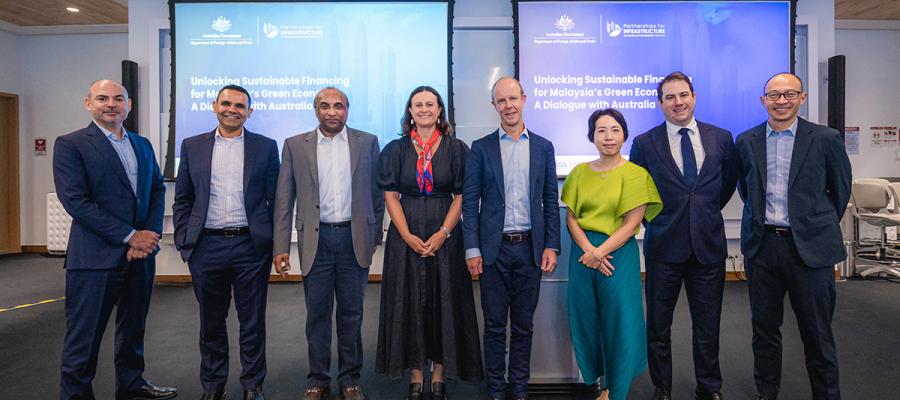If you are interested in partnering with us, please get in touch. Using P4I's flexible, innovative tools and diverse global expertise, we are confident we can design a response that is tailored to your needs.


Financing is often the missing link between climate ambition and implementation. In Southeast Asia, where infrastructure needs are high and capital gaps persistent, creating the conditions for sustainable investment is now a central policy challenge, and crucially, that means putting the right policy frameworks in place to make that investment possible in the first place.
That was the driving message behind Unlocking Sustainable Financing for Malaysia’s Green Economy, a forum held in Kuala Lumpur on 3 June 2025, co-hosted by the Australian High Commission to Malaysia, Melbourne Climate Futures, and the Asia School of Business, and delivered through Partnerships for Infrastructure (P4I). The event brought together representatives from government agencies, the private sector, financial institutions, academia, and research organisations to explore how capital, policy, and collaboration can work together to accelerate climate-aligned investment.
Opening the forum, H.E. Danielle Heinecke, Australian High Commissioner to Malaysia, framed the clean energy transition not just as a technical or economic challenge, but as a policy one. Without clear, predictable frameworks, she noted, investment won’t flow at the pace or scale required.
Her remarks made one thing clear: capital follows certainty, and the path to net-zero will depend on policy frameworks that are credible, aligned, and ready to move money.
A core theme of the forum’s morning panel, moderated by Gilles Pascual (P4I), was creating an “enabling environment” for sustainable finance to facilitate the energy transition.
Speakers from GFANZ, Bursa Malaysia, and ASB discussed Malaysia’s development of national taxonomies and climate risk frameworks to guide financial institutions toward lower-carbon portfolios, highlighting Malaysia’s Climate Change and Principle-based Taxonomy (CCPT) as a key regulatory tool. However, they noted that regulation alone is not enough to unlock investor confidence, and gaps such as limited climate data, technical expertise shortages, and uncertainty around credible transition plans must be addressed through capacity building and standardised frameworks.
In another session, P4I shared the financial instruments that support sustainable infrastructure, highlighting sustainable bonds and loans, transition finance, and blended finance to unlock investment and accelerate project delivery. Blended finance stood out for its ability to reduce risk and attract capital to projects seen as uncertain or complex, especially projects critical to the energy transition such as grid upgrades and port decarbonisation. Success, however, depends on strong governance, clear sustainability criteria, and alignment with frameworks like the ASEAN Taxonomy and Malaysia’s CCPT, which together build the transparency and trust needed to scale sustainable finance.
Malaysia is taking a leading role in Southeast Asia’s sustainable finance landscape, with its net-zero transition expected to require RM1.2 trillion (approximately US$270 billion). The country has advanced key regulatory frameworks, including the CCPT and mandatory ESG reporting, that foster transparency and guide capital toward climate-aligned projects. As ASEAN chair, Malaysia is also driving efforts to harmonise sustainable finance frameworks and regulations across the region, building investor confidence through greater interoperability.
Australia’s support complements this leadership through initiatives such as the $2 billion Southeast Asia Investment Financing Facility (SEAIFF), Export Finance Australia, and the P4I program. These collaborations provide both financial resources and technical expertise, backing projects in Malaysia on energy storage, port decarbonisation, and infrastructure planning.
Together, these coordinated efforts underscore a shared commitment to translating policy frameworks and financial innovation into practical investment, accelerating Southeast Asia’s just and resilient energy transition.
If you are interested in partnering with us, please get in touch. Using P4I's flexible, innovative tools and diverse global expertise, we are confident we can design a response that is tailored to your needs.
